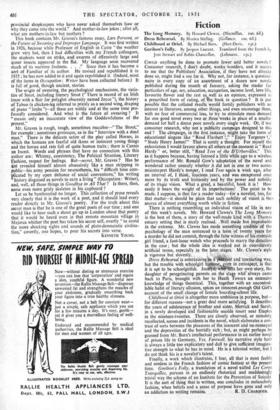Fiction
jean Stewart and Robin Chancellor. (Lehmann. 'is.)
COULD anything be done to promote fewer and better novels ? Consumer research, I don't doubt, works wonders, and it occurs to me that the Publishers' Association, if they have not already done so, might find a use for it. Why not, for instance, a question- naire in every copy of an assortment of a dozen new novels published during the month of January, asking the reader for particulars of age, sex, education, occupation, income level, love life, favourite flower and the rest as well as an opinion, expressed in a prescribed form of rating, of the book in question ? It is just possible that the collated results would fortify publishers with an interest in literature, among other things, and even encourage them, with no fear of commercial loss, to try to stimulate mass demand for one good novel every two or.three-weeks in place of a smaller demand for half a dozen poor novels every single week. Or, if not consumer research, why not a publicity campaign designed to this end ? The campaign, in the first. instance, might take the form of educational slogans like " Read Flaubert ! ," Enjoy Turgenev I ," " Study Henry James!" That is surely a thought: For_ myself the exhortation I would favour above, all others-at the:moment is " Read Hardy " or, better still, " Read Tess of the. D'Urberyilles." This as it happens because, having listened a little while ago to a wireless performance of Mr. Ronald Gow's adaptation -of the novel and wondered rather uneasily whether it did not, in one or two scenes misinterpret Hardy's temper, Vread Tess again a week ago, after an interval- of, I think, -fourteen. years, and was enraptured once more by its truth and - htimanity and by the power and nobility of its tragic vision. What a great, a beautiful, book it is I How easily it bears the weight of its. imperfections! The point to be made, I suppose, is that for a reader today-Lfor a novelist, too, for that matter—it should be plain that such nobility of visiod is the source of almost everything worth while in fiction.
There is nothing resembling an individual vision of life in any of this week's novels. Mr. Howard Clewes's The Long Memory is the best of them, a story of the well-made kind with a Thames estuary setting that is nicely realised. -.Well _made but improbable in the extreme. Mr. Clewes has made something credible of the psychology of the man sentenced to a term of twenty years for a murder he did not commit, through the false witness of his riverside girl friend, a foot-loose wench who proceeds to marry the detective in the case ; but the whole idea is worked out in convulsively artificial terms, especially ia the later. stages. Mr. Clewes's style is vigorous but slovenly. . . Dress Rehearsal is entertamingbn Millicant and Unexacting way, but the trouble with schoolgirl h444.ur,„..eyen in retrospect, is that it is apt to be schoolgirlish. her own story, the daughter of peregrinating parents. on the stage whole always came back to Paris, brought with her to Heath Towers an extensive .knowledge of things theatrical. This, together with an uncontrol- lable habit of literary allusion, spices an innocent nnough Old Girl's account of the small change of female boarding-school hie.
Childhood at Oriol is altogether more ambitious in purpose, but— for different reasons—not a great deal more satisfying. It describes the years of adolescence of brother and sister, Merrick and Sarah, in a newly developed and failiiOnabfe seaside resort near Etaples in the nineteen-twenties. There are closely observed, or minutely recollected, scenes and incidents in the novel, which elaborates a con- trast of sorts between the pleasures of the innocent and un-moneyed and the depravities of the horridly rich ; but, as might perhaps be guessed from Mr. Burn's intellectual performance in an earlier novel of prison life in Germany, Yes, Farewell, his narrative style here is always a little too explicatory and dull to give sufficient imagina- tive strength to what he has in mind. He is a talented writer, but I do MA think his is a novelist's talent.
Finally, a work which illustrates, I fear, all that is most feeble and aimless in the French fashion of comic fantasy at the present time. Goribon's Folly, a translation of a novel called tes Corps Tranquilles, pursues in an endlessly rhetorical and maddeningly trivial way the scheme of an Institute for the Prevention of Suicide. It is the sort of thing that is written, one concludes in melancholy fashion, when beliefs and a sense of purpose have gone and only an addiction to writing remains. . R. D. CHAKQUES.


































 Previous page
Previous page